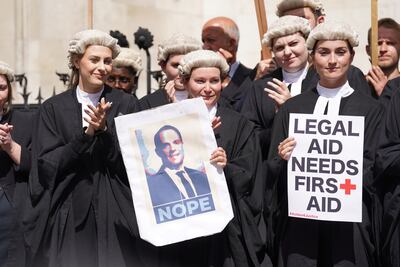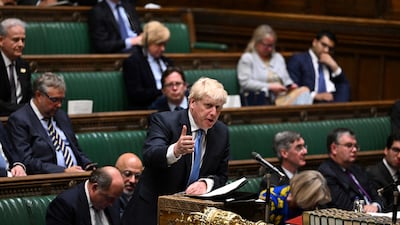“How did you go bankrupt?” a character asks in Ernest Hemingway’s novel The Sun Also Rises. The other character replies: “Two ways. Gradually, then suddenly.” Something similar is happening in British politics. Although the bankruptcy is moral and political, it has been gradual. And now it may become sudden.
The British Conservative party historically gets rid of leaders very quickly if they lose the party’s confidence. Margaret Thatcher and William Hague, both talented figures, are obvious examples. British Prime Minister Boris Johnson, however, hangs on despite successive scandals and failures to deliver. But some see signs that “suddenly” things may change. The former British tabloid editor David Yelland, whose political antennae are well-tuned, noticed a turning point. The Daily Mail newspaper titles, as Yelland put it, "suddenly turned on Johnson". That may be because even Conservative-supporting newspapers have had enough of Westminster sleaze in a UK beset by plenty of bad news. It’s everywhere.
Last week, I flew on a work visit from London to Belfast and unfortunately, London City airport was like a zoo, with exceptionally long queues at check-in and security. Since the coronavirus crisis, many lower-paid airport workers have quit. There are unfilled vacancies for security and other staff. Worker shortages are made worse by Brexit, which has hit transport, meat processors, building companies, farmers, the hospitality industry and others.
This is not just more bureaucracy. It’s also because post-Brexit, the UK economy is weaker and so is the pound. That means Romanian, Polish and other EU workers can make more money in the eurozone than in the UK. At the last minute, my return flight from Belfast to London was cancelled along with many other flights to overwhelmed UK airports.
When I tried to re-book any flight back to any London airport, the call centre staff were clearly overwhelmed. British airport chaos is not their fault. But that chaos is mirrored by serious discontent all across British businesses, professions and the economy.
On a railway journey in Kent, a train guard explained to me that he lost hundreds of pounds in wages because he was part of a three-day rail strike last month. Why did he strike? Because, he responded, he and his fellow workers see prices going up 10 per cent.
After years of low pay and declining living standards, they need, he said, a substantial pay rise. Strike action has also hit English courts and other institutions. Criminal barristers, the lawyers who defend people on criminal charges, refused to go to work and picketed the courts. Family doctors, members of the British Medical Association, say their incomes have fallen in real terms over the past 14 years. They want a 30 per cent rise over the next five years as “full pay restoration”.

Other healthcare workers including the Royal College of Nursing are also demanding pay increases. Some teaching unions are threatening industrial action. And all this adds up to the possibility of an autumn and winter of significant discontent and economic dislocation.
Of course, the Russian invasion of Ukraine, the increase in fuel prices to £2 (about $2.50) a litre, and the coronavirus epidemic are not the fault of any British government or prime minister. But in a nation grappling with feel-bad experiences, it is very unhelpful to have a government embroiled in a new scandal every week.
The latest (at the time of writing) involves a Conservative government minister accused of drunkenly “groping” other men. Then there is another strange revelation about Mr Johnson a few years ago as foreign secretary. He tried to get Carrie, then his mistress and now his wife, a £100,000-a-year government job. Mr Johnson failed, but he certainly tried. Meanwhile outside politics, six English police forces, including the biggest, London’s Metropolitan Police, are in various ways in special measures as a result of their own failures and scandals.
These are not, in general, stories of lawbreaking. They are stories of falling standards in British public life. We expect better. Opinion polls suggest many of us are genuinely appalled by devious behaviour at the top of British politics. The sense is that of a great country that is losing, or perhaps has already lost, its way, and a prime minister who once may have seemed entertaining but now is merely embarrassing.
Perhaps, like Hemingway’s bankrupt character, the political bankruptcy that has gradually been building will suddenly bring about change. It has already begun with the resignation of two key ministers, the Chancellor of the Exchequer Rishi Sunak and the Health Secretary Sajid Javid, plus a number of more junior figures. And perhaps summer sunshine and summer holidays will improve the national mood. But that will not help those of us stuck in airports, or who cannot get a doctor’s appointment, or those whose children are being taught by overworked underpaid and grumpy teachers.
Real change requires effective and trusted leadership. That’s what is missing.


